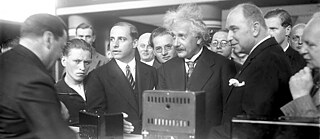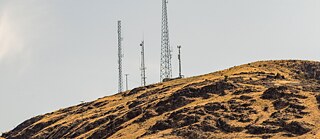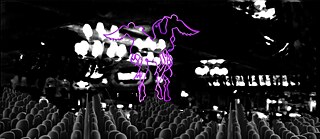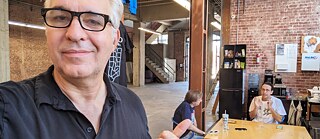1930 in Berlin Einstein and the Radio

Albert Einstein lies on Schwielowsee Lake and laughs his head off. The following radio story by Pascal Richmann features the following characters: Albert Einstein, Don Quixote, Frankenstein and the founder of Universal Studios, Carl Laemmle.
On 18th May 1932, Einstein lies on Schwielowsee Lake and laughs his head off. The fact that his initials spell AE, or Ä, is not something he’s noticed before, but now that he’s thinking about expatriation it occurs to Einstein. As is always the case when he goes sailing, Einstein isn’t wearing a lifejacket. He can imagine lots of things, but not drowning. Einstein is 53 years old. His favourite game is Settlers of Catan. He has decided to be a kind person. He enjoys reading Don Quixote.
It was only this morning that he was lying in bed, Einstein lay there completely naked, with no trousers, underpants or hat, balancing the book in a ceilingward stance. He kept on re-reading the chapter in which the books of chivalry are flung out of the window because Don Quixote is having some problems. He is supposedly unable to distinguish between novels and reality. And Cervantes? Before he had even made acquaintance with his Quixote, he became involved in the naval battle of Lepanto. It was a war, no different to any other before or since: “You who were with me in the ships at Mylae!” So that was Cervantes, ON THE HIGH SEAS, who got hit in the arm by a bullet, el manco de Lepanto, who lost his left hand to glorify his right.
Ä spelled as AE, thinks Einstein and laughs, and sets sail back to Caputh. Reality, he thinks, battles and books of chivalry. At home Einstein gets changed, dressing up smartly alongside his wife for a date at the Zoopalast. In the S7 they talk about Mary Shelley, and Einstein’s cross that he hasn’t managed to read Frankenstein a second time before the premiere, even though he did enjoy the book. The Einsteins buy a small popcorn and finish it off quickly, it’s all gone by the time before the projector starts off with Carl Laemmle’s trigger warning.
Because of the pitchforks that darken the moon in the closing scene, Einstein dreams OF FEUDALISM IN EAST FRISIA that night. There’s a radio set there, and he can ask it anything. My best old friend and squire, he thinks at one point, pretty much at the beginning of the dream. Of course Einstein carries it on his shoulder, as it’s designed rather like a jackdaw. In Norddeich Mole, on the way to the island of Norderney, the pair experience many adventures, which bring them even closer together. But suddenly, at first Einstein doesn’t understand what’s happening, the radio starts to speak differently. When Sancho Panza just plays the role of squire alongside his master Quixote, because that’s always needed, top and bottom, Laurel and Hardy, at that point he would suddenly stop. The thing is, what’s got into the radio is COMPLETELY ANTISOCIAL. It’s the gravity of feudalism that’s taken hold here. For instance if Einstein wants to find out a ferry connection, the radio gets funny. Einstein is under the impression that the radio represents certain INTERESTS, in this instance that of a well-fed ferryman with a boat of gold.
So there’s Carl Laemmle, in the studio, waiting. He’s not afraid. Smalltalk, he knows, was made at the frontier, as they commit genocide and farm the fields. The Mid-West was too far not to mention. Like most of what can be seen in westerns, there was never any such thing as a taciturn cowboy. Carl Laemmle hates westerns. Carl Laemmle’s only western is called All Quiet on the Western Front. He produces horror films instead. He does also think that stories are REAL as soon as you write them down, lightning strike and conductor, Frankenstein, monster, the miraculous sign.
“Ladies and Gentlemen who are present and who are not! When you hear the radio think also about the fact how people have come to possess such a wonderful tool of communication. The origin of all technical achievements is the divine curiosity and the play instinct of the working and thinking researcher,” – that’s how Einstein expressed it under the Radio Tower, presenting everything and only then accomplishing it, robbing the dead, lists, the severed hands, again and again, arithmetic, mementos and flowers floating on the water.


